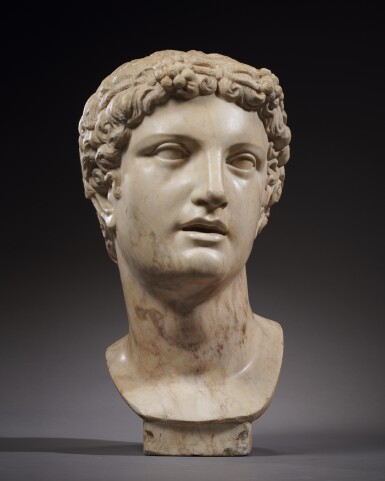Giovanni Pratesi: The Florentine Eye
Giovanni Pratesi: The Florentine Eye

Circle of Baccio Bandinelli
Bust of the Young Bacchus
Auction Closed
March 22, 07:15 PM GMT
Estimate
80,000 - 120,000 EUR
Lot Details
Description
Circle of Baccio Bandinelli (Florence 1493 - 1560)
Italian, Florence, first half 16th century
Bust of the Young Bacchus
marble
43cm., 18⅞in.
L. Segregondi, T. Lizuka (eds.), Michelangelo and the Ideal Body, Tokyo, 2018
Tokyo, The National Museum of Western Art, Ideali di bellezza maschile dalla Grecia a Michelangelo, 2018
The modest crown of vine leaves and small bunches of grapes identify this youthful ideal head as Bacchus. The smooth features and detached, sensual expression recall statues of Bacchus by Michelangelo and Jacopo Sansovino, both today in the Museo Nazionale del Bargello, Florence. The style of our head of Bacchus indicates that its sculptor was active in the vibrant artistic context of early 16th century Florence.
In 2014, Professor Giancarlo Gentilini and Dott. Lorenzo Principi proposed several stylistic comparisons with the works of Baccio Bandinelli. Compare, for example, the idealized features and luscious curly hair of Bandinelli’s full-length figure, known as either Adam or Bacchus in the Galleria Palatina, Florence, or the Apollo in the Grotta grande of the Boboli Gardens, the latter attributed to Bandinelli and workshop. Bandinelli’s sculpture was the focus of a retrospective exhibition at the Bargello in 2014 which focused attention on his documented and autograph works. Whilst the style of the present head of Bacchus has affinities with Bandinelli, there are a number of highly accomplished sculptors working in Florence at the time whose style could be said to relate to it. Sculptors such as Bartolomeo Ammannati, Pierino da Vinci, Giovanni Bandini, Battist Lorenzi and Vincenzo de’ Rossi were all active at the period.
The present lot is the subject of an expertise by Prof. Giancarlo Gentilini and Dott. Lorenzo Principi, dated 2014
